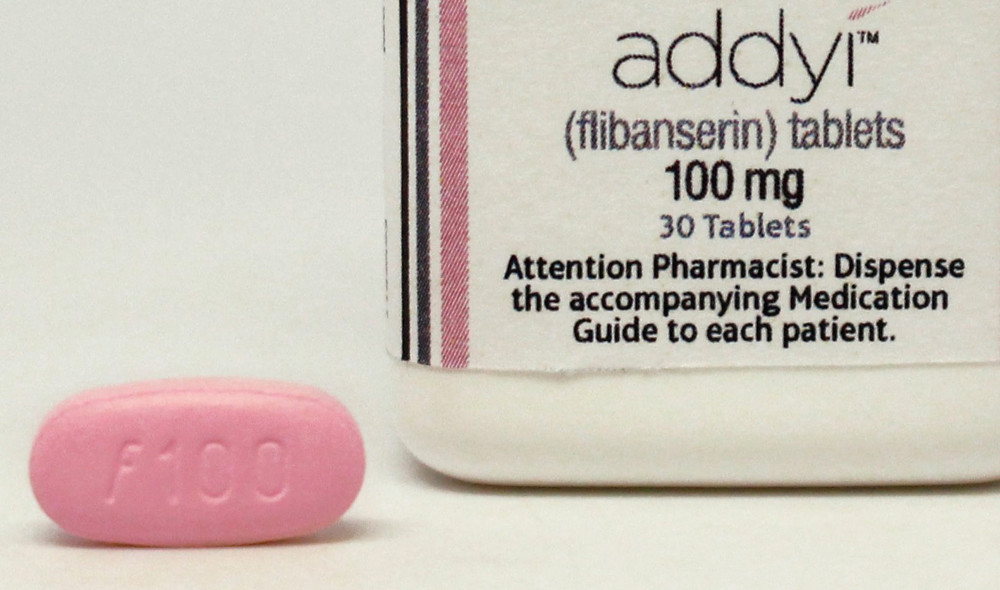By Heidi Stevens
Chicago Tribune.
Addyi, better known as “female Viagra” (though it’s not a very accurate comparison), is either a long-overdue acknowledgment that women’s sexual health matters as much as men’s, or the latest attempt to make women feel broken about sex.
Depends whom you believe.
Approved by the U.S. Food and Drug Administration in mid-August, Addyi (pronounced add-ee) is designed to treat “generalized hypoactive sexual desire disorder” (HSDD) in pre-menopausal women.
“It’s for women who’ve known a different level of desire,” Cindy Whitehead, CEO of Sprout Pharmaceuticals, told me. “Women who had a different normal before, and they’re bothered by it, and they want to do something about it.”
Sprout manufactures Addyi (also known as flibanserin), which is a nonhormonal pill that women can take once a day, unlike Viagra and other erectile dysfunction drugs for men that are designed to be taken only in advance of sex.
“Women are pretty clear they’re not on-demand creatures,” Whitehead said. “The media loves to call this female Viagra, but that’s the point at which we start the real conversation on how this is different for women. Desire is a state. This goes back to making sure those brain chemicals are aligned in a way that allows desire to take hold.”
The drug, Whitehead says, increases the brain’s levels of dopamine and norepinephrine, which increase sex drive, and decreases the brain’s levels of serotonin, which can slow sex drive.
But critics of Addyi say the drug is overkill.
“The misrepresentation that everybody should be having (sex), needs to have it, wants to have it, has a problem if they don’t have it, is to change, really, what sexuality is into more of a medical thing,” Leonore Tiefer, a psychologist at New York University, told National Public Radio earlier this year. “I think that’s a terrible direction for knowledge, for understanding, for society.”
Sex researcher Emily Nagoski, author of “Come As You Are: The Surprising New Science That Will Transform Your Sex Life” (Simon & Schuster), penned an op-ed for the Tribune recently that called Addyi a misunderstanding of female desire.
“The supposed problem that flibanserin helps women solve is an absence of spontaneous, out-of-nowhere desire,” Nagoski wrote.
But many women don’t experience that “craving sensation,” she contends, without stimulation.
“Research over the last 20 years has found that there is another totally legitimate way to experience desire,” Nagoski wrote.
“It is called responsive desire, because it emerges in response to pleasure, whereas spontaneous desire emerges in anticipation of pleasure.
“Responsive desire isn’t worse than spontaneous desire; it’s just different,” she continued. “Yet Sprout … appears, shockingly, not to realize that a little ‘winding up’ is perfectly normal.”
Whitehead calls the criticisms “out of line with the medical understanding of this particular condition.”
“Normal desire fluctuates,” Whitehead said. “For women with HSDD, these are women who used to have desire, and now, you can remove all the other factors, kids, exhaustion, no privacy, and they still have no desire.”
She says brain scans of women who participated in drug trials for Addyi showed that some participants, when exposed to erotic stimuli, had regions of their brain light up.
“For women with HSDD, you don’t see that same light-up,” she said.
“In all candor, the reason I got into this is I was tired of the societal narrative that will reduce all things in the bedroom for men to biology and all things for women in the bedroom to psychology,” Whitehead told me. “The idea that women share their stories of losing all desire and we say, ‘Come on, that’s normal’, that’s actually very unfair to women who wish to want to have sex again.
“It’s not unlike what we used to say about depression, ‘Oh, you’re just feeling a little blue,'” she said. “There’s a brain imbalance, and for some patients, a prescribed drug can be very effective.”
Addyi, which will be available Oct. 17, has numerous possible side effects, including dizziness, nausea and insomnia. A complete list of possible side effects can be found on Sprout’s website.
Which is why, above all, the most important conversations around Addyi should occur in your doctor’s office.
I am all for treating women’s sexual health and pleasure with the same regard and urgency we’ve been devoting to men’s for decades.
But that treatment has to take into account the enormous range of “normal” for sexual desire, from one individual to another, of course, but also within one person’s lifetime, allowing fluctuations related to relationships and other life circumstances.
I want to view Addyi as progress, but if it’s used to make women feel that their normal, default feelings about sex aren’t good enough, it will be anything but.














































































































































































































































































































































































